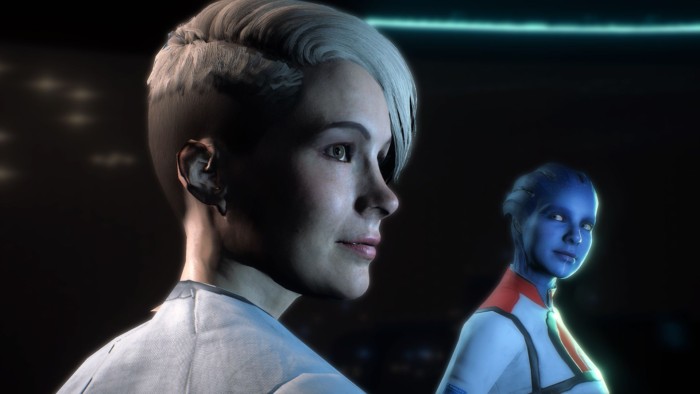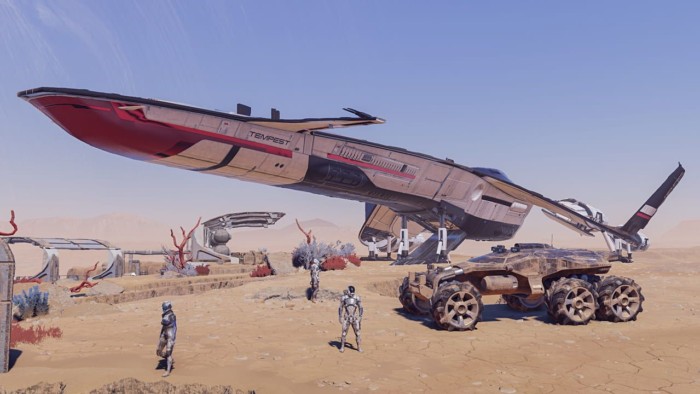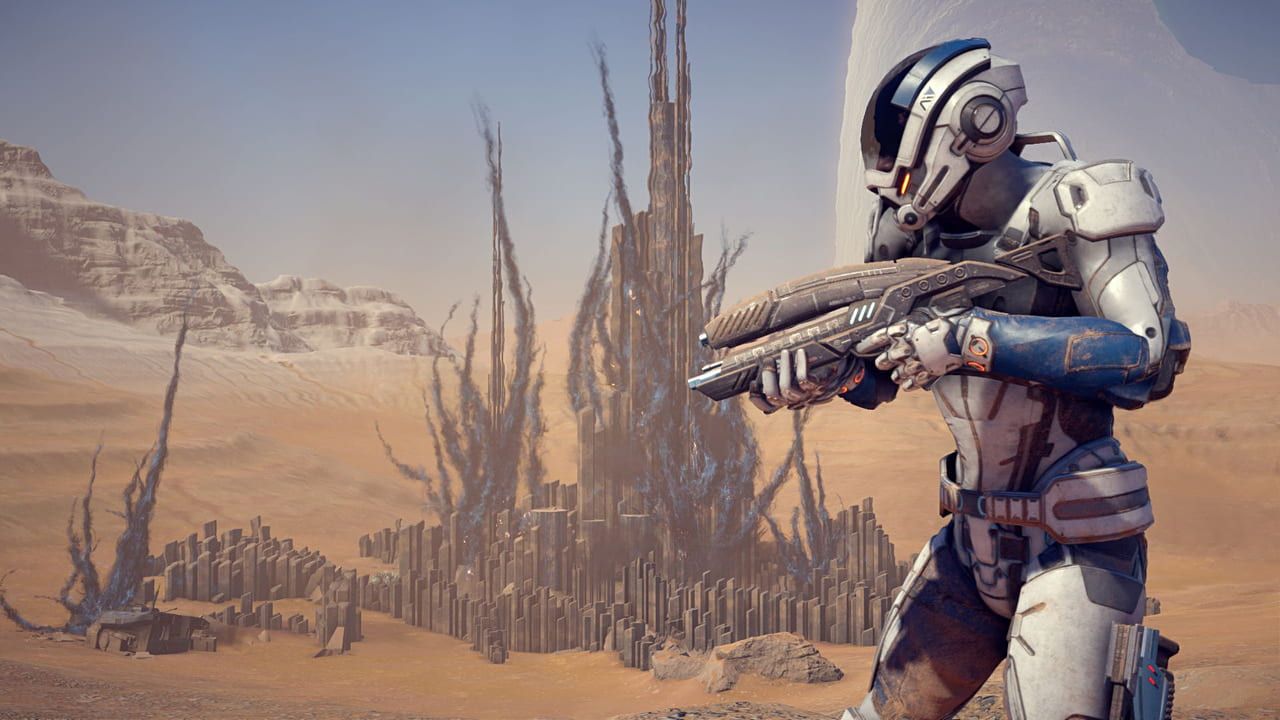Should the masses be so critical about Mass Effect: Andromeda?
Upon starting up my seventh playthrough of Mass Effect: Andromeda, the thought “I have no life” was the first that flashed across my mind. My second was of what exactly kept pulling me back into the game in spite of the fact that it’s almost universally despised. For a moment I questioned whether I was in some kind of unhealthy relationship, whether everyone could see something that I couldn’t or didn’t want to face. This crisis passed quickly, however, once I remembered that the hordes of fans ranting in comment sections across the internet aren’t in any way the font of all knowledge.
To me Andromeda is a great game and the abuse it has received has disfigured it as unfairly as it has completely. What with the tenth anniversary of the series having just arrived, I figured I’d take a stand for this maligned fourth instalment and tell everybody exactly why they’re wrong.

Image Credit: Bioware, Flickr
First of all, let’s take a look at its faults. When searching for the flaw that transforms this game from great, or even just average, to some immense satanic plot to destroy Mass Effect is its graphics. Fundamentally, though, this criticism proves entirely superficial. Despite the game not having facial animations or character models comparable to games like The Last of Us or Uncharted 4, we should remember that these are tighter games and that Andromeda operates with much vaster scope. It’s a classic quality-quantity dilemma that was largely addressed by a serious patch rolled out just a week after release.
Many still insist that the desperate need for such a patch is proof enough that Andromeda was poorly put together all round. For me though, criticising a game for requiring patches doesn’t really carry any weight. I’m sure everybody who picked up Skyrim when it was first released all those Novembers ago remembers what a dire need for patches there was to make its loading system even workable, and yet it was universally praised. So why apply a double standard to Andromeda?
Andromeda’s multifaceted characters should be lauded for their depth of personality and frankly characters like Drack give many of the previous games’ characters a run for their money.
Its characterisation was impressive, too, but most people became caught up in making comparisons to the stars of Shepherd’s trilogy. I’d point out that it’s almost too easy to argue that characters given three games and, in some cases, a whole decade of space to breathe and develop are more intriguing than these new kids on the block. Andromeda’s multifaceted characters should be lauded for their depth of personality and frankly characters like Drack give many of the previous games’ characters a run for their money.
Past the faults – both real and only perceived – nobody seems to credit the massive improvements made to the series by Andromeda. What was it that made the original Mass Effect games so special? For me, it was the freedom they offered by placing choices and their consequences into the hands of the players. Andromeda surely enhances this freedom.

Image Credit: Bioware, IGDB
Its overhauled combat system allows the player to tap all manner of powers and playstyles on the fly, but ultimately prioritises preference over enforced variety. These changes allow the series to live up to its ideal of freedom mechanically as well as in its plots. Add to this the massive open world environments and new methods of exploring them in the Nomad and jump jets. Then consider the far more nuanced character development mechanics and it quickly becomes obvious that Andromeda frees the player in entirely new ways, allowing them to tread new paths and step outside of the paragon-renegade binary Shepherd had been confined to.
Fundamentally, Andromeda’s poor reception comes down to one thing: expectations.
Surely this is what makes Mass Effect what it is: that freedom. Giving up every aspect of the game to the player; allowing them to determine who they are and how they’ll respond to a whole new galaxy. You put more of yourself into a game like Mass Effect than any other, and this immersion and freedom is central to Andromeda. For me, the game addressed a great deal of the flaws of the admittedly immense Shepherd trilogy, but most coverage was dedicated to something resembling a witch hunt.
Fundamentally, Andromeda’s poor reception comes down to one thing: expectations. In many ways, I think expectation is the bane of gaming communities. Heavy-handed publishers produce unrealistically high expectations in fans for an end product that is totally unachievable and ultimately blows up in the faces of developers. This sense of expectation is particularly intense when it comes to sequels – as with Andromeda – and it’s very rare for a sequel to be greeted with glowing praise. Games like The Last of Us which stand alone and are slower to be franchised are revered for the inverse reason: they’re a surprise, and the lack of previous material grants them obvious freedoms. As the first title available across all platforms, Mass Effect 2 largely dodged this bullet but the series’ third instalment and Andromeda have, perhaps, both suffered critically for their popularity. This kind of environment is toxic and the kind of backlash that Andromeda has received makes me fear that Bioware might well put Mass Effect to bed for good. If that does indeed come to pass, I pray history will be kinder to Andromeda than we have been.

Comments (2)
I stopped reading at “a predominantly white male, homophobic portion of the consumerbase”. Trying to combat bigotry with bigotry of your own is totally unhelpful and makes you as bad as those you criticise.
Andromeda never had a fair shot, and it was due to factors on both the development end and the consumer end.
I played Andromeda twice earlier this year, and on a whim decided to start another run this week for achievements. What I’m learning through this most recent go is ME:A was a solid B-grade game that could have been an A+ if EA had devoted the necessary attention to it, and was lambasted as an F by a predominantly white male, homophobic portion of the consumerbase who set out to tank a game that was unrepentant in its aims not to cater to them. The fact of the matter is Andromeda could have been outstanding if EA hadn’t been counting on it to ride on the success of the franchise quite so much: the development was handed to a studio which had not worked on the title before, and it switched creative direction too many times as project leads either quit or were replaced. I can’t imagine how frustrating it must have been to the artists and designers on the ground who were doing their best to assemble a quality game with no real leadership.
There’s no arguing that the graphics had any business being shipped in that initial state. Even after the patch there are still moments where I’m talking to characters whose expressions don’t sync with their audio, or they’re looking aimlessly all over the place. There are instances of really, really cringeworthy voice acting. The main plot is less than engaging. None of these alone will tank a title, but all of them together (with the added benefit of a community rooting for it to fail) is what sank Andromeda. The game is not to the standard of its predecessors, but it could have been. Electronic Arts had more than enough time in the years between ME3 and ME:A’s release to produce a game that would meet the expectations they set but lacked commitment. This gave the aforementioned subsection of the player base enough fuel to turn their petty gripes into a raging inferno that suffocated the Mass Effect franchise (albeit temporarily – for now). And it’s a shame they contributed to their own downfall on this project, because it’s a great sci-fi setting and there’s a lot of good content in Andromeda itself.